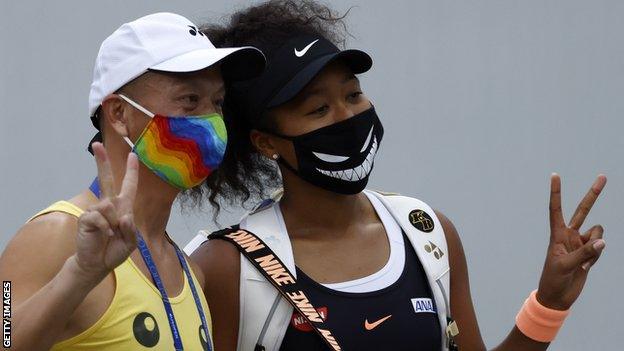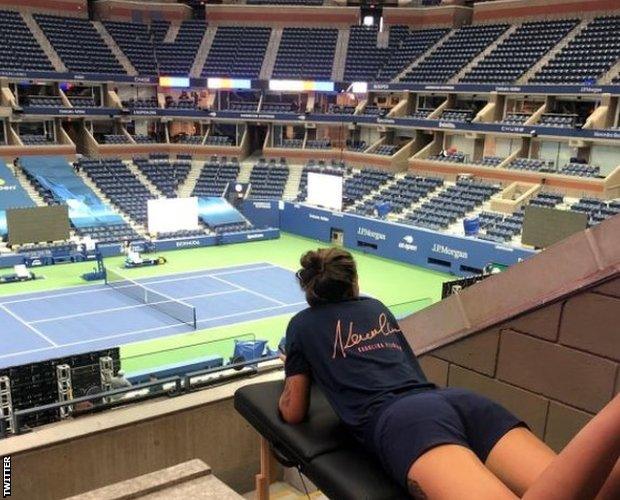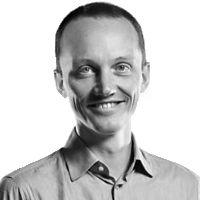US Open: What is life like in the New York bubble?
- Published

Selfies with stars like Naomi Osaka are allowed - but masks must be worn inside the bubble
US Open 2020 |
|---|
Venue: Flushing Meadows, New York Dates: 31 August - 13 September |
Coverage: Selected radio and text commentaries on BBC Radio 5 Live and the BBC Sport website, plus daily reports and analysis |
"Turning on my phone every day is a little daunting," admits the US Open's new tournament director Stacey Allaster.
"That's because the test results come in the morning."
Coronavirus test results are key as tennis prepares to stage a US Open in a pandemic world.
The bubble formed to keep nearly a thousand players, coaches, physios and officials safe - and to enable the tournament to start, as scheduled, on Monday - opened on 15 August.
Since then, there has been one positive Covid test; no-one will say how many it would take to bring the meticulously detailed plan crashing down.
So the players are settling in - either in one of the two official Long Island hotels, or in a private home, vetted by the US Tennis Association, and with 24-hour security paid out of their own pocket.
Players can choose between the Long Island Marriott, which promises "a marble bathroom, plush bedding and an abundance of natural light," and the Garden City Hotel, which advertises itself as "a landmark of gracious hospitality and first-class service".
If a player leaves the bubble without permission, they will be removed from the competition and fined. To reduce temptation, the USTA has laid on food trucks, an arcade room, a gaming room, and a golf simulator at the hotels. As a result, British number one Johanna Konta has discovered she is left-handed when it comes to golf.
Players are entitled to two double or twin rooms, and sometimes a third - much to the relief of Canada's world number 17 Denis Shapovalov. He is in New York with his girlfriend Mirjam, mother Tessa and physio Nick Marchenko. Without the extra room, Mum and physio might have had to share.
Serena Williams and Novak Djokovic have opted to go private - and even for Djokovic, however nice the garden, it is "quite a significant investment".
"They must stay on the property, they can't go for walks, they can't go to cafes, and when they leave they let us know," Allaster explained in an interview on BBC Radio 5 Live.
"When they arrive, we know when they arrive - there are lots of apps that are being used. Those homes are monitored 24 hours."
Williams felt staying in one of the player hotels would be too big a risk at the current time, given her history of blood clots in the lungs.
"At my house, I can control more," the 23-time Grand Slam singles champion said.
"There is no housekeeping, there is none of that type of stuff. I have genuine health issues that I just really needed to put my mind at rest to even be able to perform in New York.
"I'm all for the extra protocols and the extra safety. I want to know where people are going. I want to make sure that we are all keeping ourselves in this giant bubble."
On site, at the Billie Jean King National Tennis Centre, competitors must wear face masks unless playing, practising or working out. Before they are allowed to board the shuttle bus from the hotel, they must fill in a health questionnaire and record a temperature below 38C.
Suites in the Arthur Ashe Stadium, which are usually brimming with hospitality guests, have been made available to the top 32 seeds, and then to lower-ranked players as the seeds begin to fall. But there may at times be a queue for the showers, as only 30 are allowed in the locker rooms at any one time.

Czech top seed Karolina Pliskova enjoys the view out onto the Arthur Ashe Stadium from the treatment table in her private player lounge
As for testing, players are confined to their rooms on arrival until a negative Covid test has been returned. A second one follows 48 hours later, and tests are then every four days - or seven if a player has returned a positive antibody result.
Physio Juan Galvan is the only person to have tested positive so far, forcing two players with whom he works into 14 days of self-isolation. Neither Argentina's Guido Pella nor Bolivia's Hugo Dellien shared a room with Galvan, but the New York City Department of Health deemed they had been in sufficiently close contact.
Players have generally been very complimentary about the environment the USTA has created. But the plight of these two has been their one major grievance. Both Djokovic and Andy Murray say they were told only players sharing a room with an infected person would be affected in this way.
Both Pella and Dellien are expected to compete next week, and their isolation has not been quite as restricted as might first appear. Both have been moved to a suite with an outdoor balcony, provided with extra fitness equipment, and even been allowed to leave the hotel to practise, wearing masks, goggles and gloves.
"We had doctors supervising all of those activities," Allaster explained.
"We found a private court that is isolated, so they are not mixing with anyone in the general public. They go from their hotel to this private court and then back into their rooms.
"Everything is on track that they will be able to play next week. The New York City Department of Health is working with us so that official period [of isolation] will end on Sunday night, so they are permitted to be able to play on Monday."

Reading and Leeds Festival: Relive sets from Arctic Monkeys, Billie Eilish, The 1975 and more
US Election: What's the latest on the presidential race?

